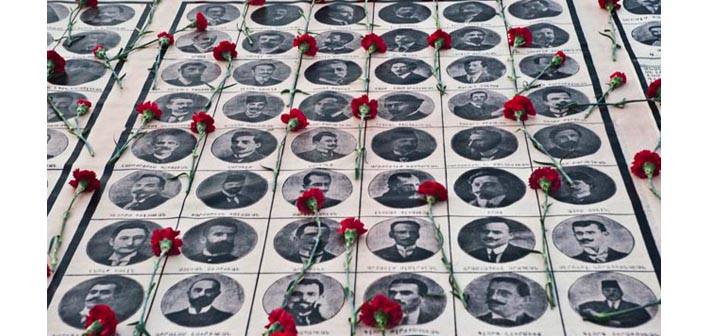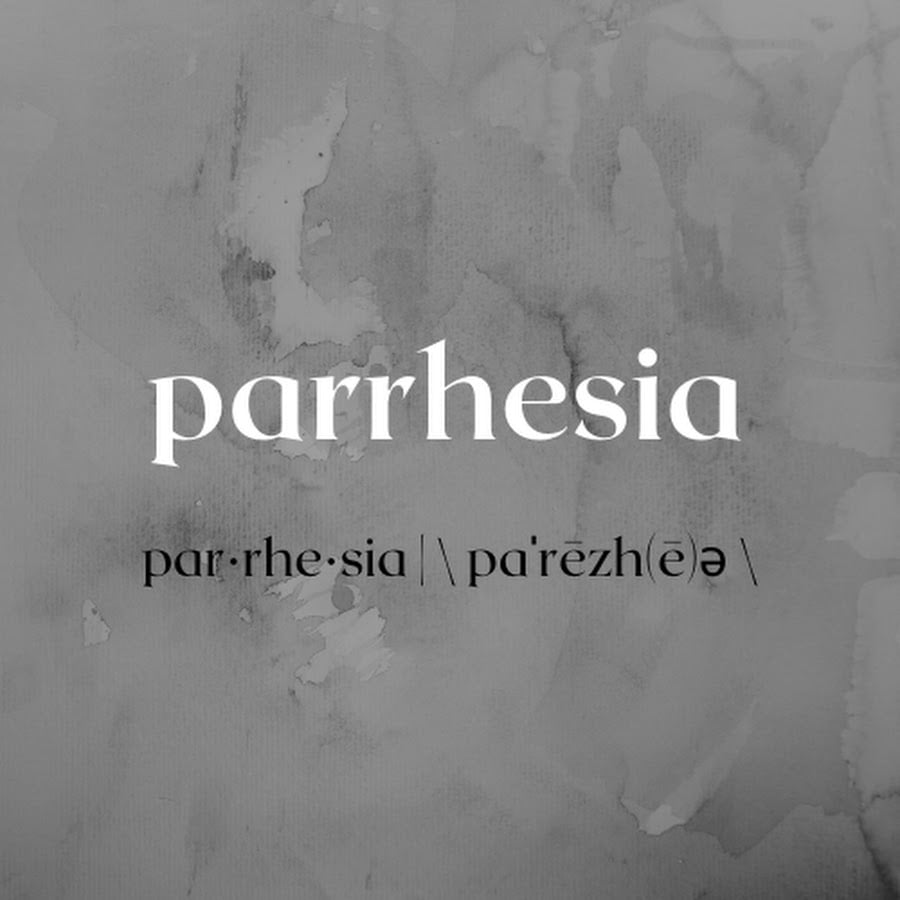In April telling the truth is difficult, so is having the courage to hear it
Wasn't the destruction experienced by the Balıkçı family a reflection of our common, perhaps unspoken pasts, which in fact still exist? With Hrant Dink and Sevag Balıkçı, we clearly saw that an experience and temporality that had been ignored for a hundred years to make us believe that its time had passed, was actually always with us.


As Parrhesia Collective, in our social media posts two years ago in April, we said that it is difficult to tell the truth and listen to the truth in April. Indeed, April has always been a difficult month for those who want to speak the truth about the Armenian genocide, and it has become even more difficult in recent years. We are putting the lesson, we all know very well, before us again that time does not always lead us to the better and the progressive.... As a collective we have focused on two issues; : first, that we need to reflect on temporality and its meaning, and second, that denial has stolen from us our own temporality, and even the most basic knowledge about ourselves.
In April last year, we had a webinar with East Asian historian Harry Harootunian, who made two important points. The first was that genocide is the most complicated, complex crime known and therefore cannot be explained by a single cause. This perspective offered an important alternative to explaining genocides with nationalism, racism, hatred and envy. Each of us experienced the inadequacy of these concepts in our every day lives. Let's ask a question following the logic of explaining genocides with nationalism: How big, how long-lasting, how organized anger, hatred and envy could be, to get organized to destroy another group of people? Even the question sounds illogical. However, if we consider that the crime of genocide is one of the most complex, multi-layered and data-demanding crimes, we can understand that what happened to the Armenians was the culmination of institutional, administrative, social and economic processes that have been going on since the first half of the 19th century, which were based on structural, changing power relations that go far beyond nationalism, hatred and resentment.
The second point Harootunian drew attention to was that the most basic function of all empires was to exploit all the resources of their subjects. At this point, the encounter of the indigenous peoples of South and North America with the Europeans and the various forms of oppression, persecution and extermination they experienced helped us to realize that what happened to the Armenians and the autochthonous peoples of the region in general was indeed very similar.
As we continued to reflect on colonial and indigenous encounters and their consequences, we realized that, contrary to the theses of nationalism, our horizons expanded. For example, James Baldwin telling the white journalist woman who tried to interview him "I don't know you personally, because I know you historically" or Bell Hooks' sentence "tell me your pain so that I can tell you your story again as my story" while drawing attention to the colonizer's unending authority over the indigenous, Walter Benjamin's statement that the history of the oppressed contains the most important information about the oppressor, or Toni Morison's pointing out how racism distracts us and forces us to constantly explain our raison d'être, led to a series of realizations. In addition, the notion of asynchronicity or non-contemporaneity, the fact that even if they live in the same place, indigenous and the colonizer do not share the same time, as the colonizer considers the autochthnous non-existent, was an important discovery in itself. Wasn't the destruction experienced by the Balıkçı family a reflection of our common, perhaps unspoken pasts, which in fact still exist? With Hrant Dink and Sevag Balıkçı, we clearly saw that an experience and temporality that had been ignored for a hundred years to make us believe that its time had passed, was actually always with us.
Last November, we organized a webinar with Marc Nichanian in Armenian, in which we tried to touch upon the author's entire body of work. In this webinar, Nichanian explained his use of the word Aghed for the Armenian genocide, saying "Aghed is a concept that comes to us from the future. In other words, Aghed is a word that we do not use because we do not yet understand what has happened to us." In saying this, Nichanian was drawing our attention to the fact that we may not yet know what a crime of genocide entails, what processes it involves, what kind of background it may have, that what happened in that process is still unfolding in front of us layer by layer, and that we still have not comprehended everything. This point of view was, of course, very much in line with how complex and difficult to understand this crime is. In this webinar, Nichanian explained very clearly why he prefers the concept of Aghed instead of genocide, and how this word implies an infinite catastrophe.
To conclude, in the last two years, by reflecting on what autochthonous means to, what we know about ourselves, what our own temporality means to us, what the indigenous peoples’ relationship with nature and the environment is like, and how this is reflected in literature and art, we have been able to take small steps towards getting out of the dead ends we feel trapped in, realizing that we are not alone, and seeing that indigenous peoples around the world face exactly the same what we have been living through.
In April last year, we had a webinar with East Asian historian Harry Harootunian, who made two important points. The first was that genocide is the most complicated, complex crime known and therefore cannot be explained by a single cause. This perspective offered an important alternative to explaining genocides with nationalism, racism, hatred and envy. Each of us experienced the inadequacy of these concepts in our every day lives. Let's ask a question following the logic of explaining genocides with nationalism: How big, how long-lasting, how organized anger, hatred and envy could be, to get organized to destroy another group of people? Even the question sounds illogical. However, if we consider that the crime of genocide is one of the most complex, multi-layered and data-demanding crimes, we can understand that what happened to the Armenians was the culmination of institutional, administrative, social and economic processes that have been going on since the first half of the 19th century, which were based on structural, changing power relations that go far beyond nationalism, hatred and resentment.
The second point Harootunian drew attention to was that the most basic function of all empires was to exploit all the resources of their subjects. At this point, the encounter of the indigenous peoples of South and North America with the Europeans and the various forms of oppression, persecution and extermination they experienced helped us to realize that what happened to the Armenians and the autochthonous peoples of the region in general was indeed very similar.
As we continued to reflect on colonial and indigenous encounters and their consequences, we realized that, contrary to the theses of nationalism, our horizons expanded. For example, James Baldwin telling the white journalist woman who tried to interview him "I don't know you personally, because I know you historically" or Bell Hooks' sentence "tell me your pain so that I can tell you your story again as my story" while drawing attention to the colonizer's unending authority over the indigenous, Walter Benjamin's statement that the history of the oppressed contains the most important information about the oppressor, or Toni Morison's pointing out how racism distracts us and forces us to constantly explain our raison d'être, led to a series of realizations. In addition, the notion of asynchronicity or non-contemporaneity, the fact that even if they live in the same place, indigenous and the colonizer do not share the same time, as the colonizer considers the autochthnous non-existent, was an important discovery in itself. Wasn't the destruction experienced by the Balıkçı family a reflection of our common, perhaps unspoken pasts, which in fact still exist? With Hrant Dink and Sevag Balıkçı, we clearly saw that an experience and temporality that had been ignored for a hundred years to make us believe that its time had passed, was actually always with us.
Last November, we organized a webinar with Marc Nichanian in Armenian, in which we tried to touch upon the author's entire body of work. In this webinar, Nichanian explained his use of the word Aghed for the Armenian genocide, saying "Aghed is a concept that comes to us from the future. In other words, Aghed is a word that we do not use because we do not yet understand what has happened to us." In saying this, Nichanian was drawing our attention to the fact that we may not yet know what a crime of genocide entails, what processes it involves, what kind of background it may have, that what happened in that process is still unfolding in front of us layer by layer, and that we still have not comprehended everything. This point of view was, of course, very much in line with how complex and difficult to understand this crime is. In this webinar, Nichanian explained very clearly why he prefers the concept of Aghed instead of genocide, and how this word implies an infinite catastrophe.
To conclude, in the last two years, by reflecting on what autochthonous means to, what we know about ourselves, what our own temporality means to us, what the indigenous peoples’ relationship with nature and the environment is like, and how this is reflected in literature and art, we have been able to take small steps towards getting out of the dead ends we feel trapped in, realizing that we are not alone, and seeing that indigenous peoples around the world face exactly the same what we have been living through.



